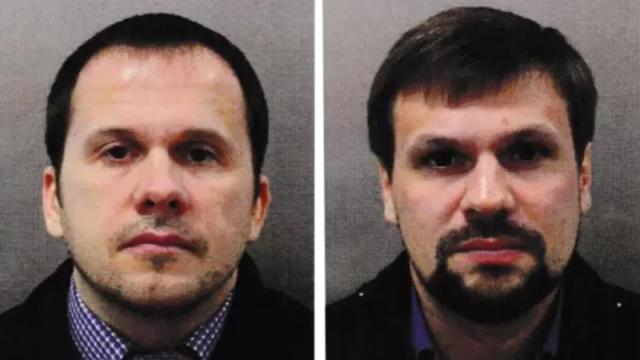British police and counterterrorism officials have identified two men they believe are responsible for the poisoning of former double agent Sergei Skripal, his daughter Yulia Skripal, as well as two bystanders. The suspects are Russians, identified as Alexander Petrov and Ruslan Boshirov, though British authorities say the names are probably aliases.
“Both suspects are approximately 40 years old, and are Russian nationals who were travelling on Russian passports,” the UK’s Metropolitan Police said in a statement issued last night.
While the Skripals were poisoned intentionally using a nerve agent called Novichok, the two bystanders are believed to have been poisoned accidentally. Dawn Sturgess and her partner Charlie Rowley became ill after using a perfume bottle that they found in a British park. Sturgess, a mother of three, later died. The Skripals have recovered, but are keeping a low profile.
The British government says that “there is no alternative conclusion other than that the Russian State was culpable for the attempted murder of Mr Skripal and his daughter”, and has appealed to the public for help with any more information on the two men.
Russia doesn’t extradite its citizens in the case of criminal wrongdoing in other countries but the British have obtained a European Arrest Warrant for the men.
“It is likely that they were travelling under aliases and that these are not their real names. We would like to hear from anyone who knows them. We are releasing these photographs of them, from the travel documents they used to enter the country,” Metropolitan Police said.
The Kremlin strongly denies any involvement in the Skripal poisonings and has floated a number of different conspiracy theories about who the real perpetrators might be. Russian government social media accounts often raise the possibility that the attacks were conducted by British officials to worsen relations between the UK and Russia.
In response to the poisonings, the UK expelled 23 Russian diplomats from London, and 20 other countries expelled Russian diplomats in solidarity. About 130 Russian diplomats were expelled from allied countries worldwide, including two from Australia.
Police released the following chronology for the suspects, including their initial flight from Moscow to the UK on March 2, and their flight back to Russia on March 4:
At 3pm on Friday, 2 March, the suspects arrived at Gatwick airport, having flown from Moscow on Aeroflot flight SU2588.
From there it is believed that they travelled by train into London, arriving at Victoria station at approximately 5.40pm.
They then travelled on London public transport to Waterloo station and were in the area between approximately 6pm and 7pm. They travelled to the City Stay Hotel in Bow Road, East London, where they stayed on Friday, 2 March, and Saturday, 3 March.
On Saturday, 3 March, they left the hotel and took the underground to Waterloo station, arriving at approximately 11.45am, where they caught a train to Salisbury, arriving at approximately 2.25pm.
They are believed to have taken a similar route when they returned to London on the afternoon of Saturday, 3 March. Leaving Salisbury at approximately 4.10pm and arriving in Bow at approximately 8.05 pm.
We assess that this trip was for reconnaissance of the Salisbury area and do not believe that there was any risk to the public from their movements on this day.
On Sunday, 4 March, they made the same journey from the hotel, again using the underground from Bow to Waterloo station at approximately 8.05am, before continuing their journey by train to Salisbury.
CCTV shows them in the vicinity of Mr Skripal’s house and we believe that they contaminated the front door with Novichok.
They left Salisbury and returned to Waterloo Station, arriving at approximately 4.45pm and boarded the London Underground at approximately 6.30pm to London Heathrow Airport.
From Heathrow Airport, they returned to Moscow on Aeroflot flight SU2585, departing at 10.30pm on Sunday, 4 March.
We have no evidence that they re-entered the UK after that date.
British Prime Minister Theresa May has said that they believe the two men are Russian intelligence agents who work for the GRU. May made the assertion in parliament today.
“I suspect that they wanted to give a message to those Russians who were living elsewhere who had been involved in matters relating to the Russian state,” May said to parliament. “But it is up to the Russians to explain what happened in Salisbury.”
May’s comments can be viewed on YouTube. Her remarks on the poisoning start at around the 11-minute mark.
“Mr Speaker, this chemical weapons attack on our soil was part of a wider pattern of Russian behaviour that persistently seeks to undermine our security and that of our allies around the world,” May said.
“They have fomented conflict in the Donbas, illegally annexed Crimea, repeatedly violated the national airspace of several European countries and mounted a sustained campaign of cyber-espionage and election interference,” May continued. “They were behind a violent attempted coup in Montenegro. And a Russian-made missile, launched from territory held by Russian-backed separatists, brought down MH17.”
The Russian government continues to deny any involvement. Russian foreign ministry spokeswoman Maria Zakharova said that the release of the information on the suspects “revealed nothing”.
Anyone with information about the two suspects is encouraged to make an anonymous report to phone number 0800-789-321 or to email the investigative team at Salisbury2018@met.police.uk.
“We must continue to build as comprehensive a picture as we can to reassure the public and secure a future prosecution through the UK criminal justice system,” Met Police said. “Any extra information from the public will be extremely welcome.”
